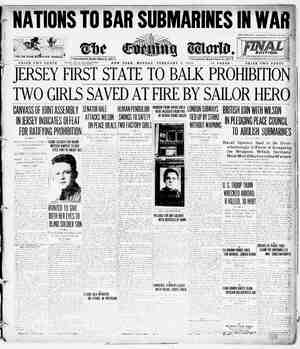The Seattle Star Newspaper, February 3, 1919, Page 9
You have reached the hourly page view limit. Unlock higher limit to our entire archive!
Subscribers enjoy higher page view limit, downloads, and exclusive features.
THE SEATTLE STAR—MONDAY, FEBRUARY a, 1919. Ship Workers Strike! Facts That the Men Must Recognize Is an agreement solemnly entered into be- tween representatives of the government and representatives of the shipyard workers a cov- enant that is binding on both sides, binding on every individual represented therein, or is it to be broken at will? Do the ‘men in the shipyards realize that the question of wages in the yards is not one be- tween the shipyard workers and the yard own- ers but is between the shipyard workers and the Emergency Fleet Corporation, representing the government of the United States? Do the men in the yards realize that both the government on one hand and the men on the other have, during the life of the Shipbuild- ing labor adjustment agreement, the so-called Macy agreement, surrendered final decision on all matters of wage, hours and conditions to the determination of three men, one represent- ing the people of the United States and ap- pointed by the President of the United States, one appointed by Samuel Gompers, represent- ing the shipyard workers, and one appointed jointly by the Navy and the cc ned Fleet Corporation? Do the men appreciate that this agreement was drawn up after the most careful consid- eration in August, 1917, which was amended after a week’s conference in December, 1917, attended by Mr. Gompers, the International Presidents and delegates from Seattle and San Francisco Metal Trades Councils, that it was signed by representatives of the Navy, The Emergency Fleet Corporation, and on behalf of the men’by the International presidents? The present agreement is as perfect an in- strument for adjudicating industrial differ- ences as has yet been devised. It provides all of the machinery necessary. It is complete. There is no room for outside mediation. It is final and binding on both sides. In order to give either side redress, awards are made for relatively short periods only, so that an unfair decision cannot be long continued. The decisions and awards of the Macy Board have resulted in wage increases that will cost the government more than $300,000,000 (THREE HUNDRED MILLION DOLLARS) on the shipbuilding program, yet the government has unflinchingly accepted the burden which the board’s decision has imposed on it. In the present case the rates have been fixed by the Macy Board, not only for the Pacific Coast but for the Great Lakes, the Atlantic and Gulf yards as well. The appeal from the decision of the board to the board of appeal failed. The decision is final because no other opportunity for reopening the case exists until after March 31, when the present award expires. Are the men going to stick to their side of the bargain? That is the question at issue. And if they do not is there any assurance that any agreement hereafter can ne considered binding? ‘ The Emergency Fleet Corporation considers itself bound by its agreement with labor to observe the existing award until its expiration. It can consent to no changes, no modifications, in one district without breaking faith with the men in all other districts. It must, therefore, insist that the award be carried out to its term- ination period. While the armistice ended hostilities it did not end the shipbuilding labor adjustment agreement. The shipyard workers of Seattle dis- trict gave such an excellent account of themselves during the war and im- pressed me so strongly as sane, loyal, conscientious Americans that I appeal to their sense of fairness to go back to work and stick by the agreement until it expires on March 31. In the mean- time a joint conference can determine what is to be done atter that period. A statement of the future plans of the Emergency Fleet Corporation will appear in this space tomorrow. CHARLES PIEZ Director General United States Shipping Board Emergency Fleet Corporation, Statement No. 1. Philadelphia, February 2, 1919.







